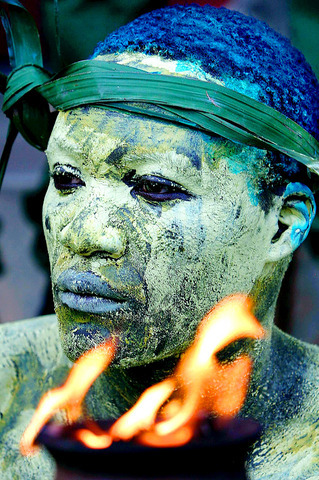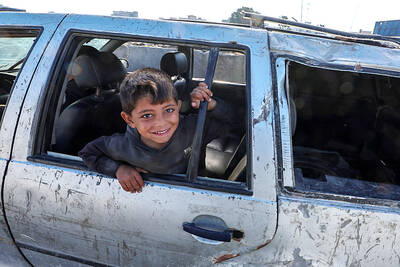The father was Africa's longest-reigning dictator, ordered his enemies executed, and claimed to be chosen by God.
Now the son is running for president of Togo in a weekend vote already shadowed by violence, with protesters threatening to die fighting if the family of the late dictator Gnassingbe Eyadema maintains its stranglehold on this tiny, impoverished west African country. As tension mounts, Togolese were praying for peace and hoping for democracy.
Togo's interim head of state on Friday vowed the elections will go ahead, and fired a minister who had called for the ballot to be canceled because of fears of bloodshed.

PHOTO: EPA
Some 2.2 million people in this nation of 5 million are registered to vote during the 6am to 6pm polling taking place today. Counting was to start immediately, but it was unclear when results would be announced.
The front-runner is Faure Gnassingbe, whose strongman father Gnassingbe Eyadema ruled for 38 years -- longer than any other leader except Fidel Castro.
Eyadema died of a heart attack Feb. 5, ending an oppressive era in which political foes were routinely tortured and killed, dissent was crushed by jackboot security forces and spies prowled the dust-blown boulevards and halls of university campuses.
Togo's military thrust Gnassingbe to power shortly after Eyadema's death, prompting such local and international outrage he stepped down and promised elections in 60 days, as stipulated by the Constitution.
Gnassingbe's three rivals in the race -- Bob Akitani, Harry Olympio and Nicolas Lawson, all longtime opposition members -- have called for the elections to be postponed, charging irregularities in voter registration and exclusion from the electoral process. Their concerns, though, have not prompted them to withdraw.
In the run-up to the vote, riot police have been accused of killing several anti-regime demonstrators. The government recently banned all private TV and radio stations from covering the elections.
On Friday, as questions over whether the vote could go ahead raised tensions, opposition protesters appeared on the streets, wielding machetes and nail-studded clubs.
Gnassingbe is backed by the military and has his father's political machine at his disposal. And as a candidate, his style seems to mimic that of his father, who kept his pinky fingernail aristocratically long and wore expensive suits and gold-rimmed sunglasses.
Gnassingbe -- a businessman educated at George Washington University in the US -- prefers tailored suits and expensive shoes. He buzzed between rallies in a rented white helicopter, unlike his main rival, the 75-year old Akitani, who campaigned in tropical shirts and traversed the country in a four-wheel drive.
Despite the echoes of his father, Gnassingbe presents himself to voters as a modern technocrat, with the youthful energy and fresh ideas it takes to bring reform in a nation where the average annual income is US$270, making it among the poorest in Africa.
"I am the new image of Togolese youth, the new image of Togo," 39-year old Gnassingbe said on a recent campaign stop in the southern town of Keve.
"I'm going to take this country to the next level," he declares. "More freedom, more democracy. It's the only way we can solve our problems."
For Gnassingbe to be taken seriously abroad, he has to escape his father's tall, ominous shadow. But at home, some observers say, Gnassingbe has a real shot at winning the vote if elections are fair.
Even some in the opposition have said Akitani, the main opponent, is too old to lead Togo into a the future.
Gnassingbe has been treated almost like a deity as he campaigned in Togo's forested interior. Speakers line up to praise him as a "unifier" and village elders in gilded crowns bow to him.
"Demonstrations and violence will not give us solutions," said Fousse Blaise, 40, after listening to Gnassingbe promise hospitals, a new town market and a peaceful election day at one rally. "We need jobs and peace, and Faure is the one promising this change.

MONEY GRAB: People were rushing to collect bills scattered on the ground after the plane transporting money crashed, which an official said hindered rescue efforts A cargo plane carrying money on Friday crashed near Bolivia’s capital, damaging about a dozen vehicles on highway, scattering bills on the ground and leaving at least 15 people dead and others injured, an official said. Bolivian Minister of Defense Marcelo Salinas said the Hercules C-130 plane was transporting newly printed Bolivian currency when it “landed and veered off the runway” at an airport in El Alto, a city adjacent to La Paz, before ending up in a nearby field. Firefighters managed to put out the flames that engulfed the aircraft. Fire chief Pavel Tovar said at least 15 people died, but

LIKE FATHER, LIKE DAUGHTER: By showing Ju-ae’s ability to handle a weapon, the photos ‘suggest she is indeed receiving training as a successor,’ an academic said North Korea on Saturday released a rare image of leader Kim Jong-un’s teenage daughter firing a rifle at a shooting range, adding to speculation that she is being groomed as his successor. Kim’s daughter, Ju-ae, has long been seen as the next in line to rule the secretive, nuclear-armed state, and took part in a string of recent high-profile outings, including last week’s military parade marking the closing stages of North Korea’s key party congress. Pyongyang’s official Korean Central News Agency (KCNA) released a photo of Ju-ae shooting a rifle at an outdoor shooting range, peering through a rifle scope

South Korea would soon no longer be one of the few countries where Google Maps does not work properly, after its security-conscious government reversed a two-decade stance to approve the export of high-precision map data to overseas servers. The approval was made “on the condition that strict security requirements are met,” the South Korean Ministry of Land, Infrastructure and Transport said. Those conditions include blurring military and other sensitive security-related facilities, as well as restricting longitude and latitude coordinates for South Korean territory on products such as Google Maps and Google Earth, it said. The decision is expected to hurt Naver and Kakao

Gaza is rapidly running out of its limited fuel supply and stocks of food staples might become tight, officials said, after Israel blocked the entry of fuel and goods into the war-shattered territory, citing fighting with Iran. The Israeli military closed all Gaza border crossings on Saturday after announcing airstrikes on Iran carried out jointly with the US. Israeli authorities late on Monday night said that they would reopen the Kerem Shalom crossing from Israel to Gaza yesterday, for “gradual entry of humanitarian aid” into the strip, without saying how much. Israeli authorities previously said the crossings could not be operated safely during